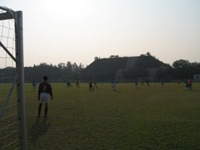| Chinese Football Permanently Offside |

|

|

|
| Features | ||||||||||||||||||||||||||||||||||||||||||||||||||||||||||||
| Sunday, 06 June 2010 | ||||||||||||||||||||||||||||||||||||||||||||||||||||||||||||
|
"You would think if any team could put up a decent wall it would be China." - Terry Venables, China vs Brazil, 2002 World Cup The FIFA World Cup, the global sporting carnival kicks off in June in South Africa. Sadly, yet again, the Chinese men’s soccer team (ranked FIFA 85th) will miss out and China’s long suffering fans will again just have to watch regional rivals Japan, South Korea, Australia and North Korea fly the AFC (Asian Football Confederation) flag. The men’s national team is the ultimate puzzle with everything in place for huge success including passionate support, commercial sponsorship and a large pool of talent to choose from; yet the team has constantly underperformed much to the frustration of fans in China and the diaspora. In a visit to China, even Arsene Wenger asked local journalists why, given the nation’s population, the China national team underachieved so much; aside from reaching the final of the 2004 Asian Cup final (losing to Japan on home soil), there has been very little to cheer about. Ultimately, what is wrong with the men’s national team! The world’s most populous nation’s men’s team last two appearances in major tournaments, the 2002 World Cup and the 2008 Beijing Olympics were underwhelming. Three defeats and no goals in the former under the stewardship of the beloved Bora Milutinovic and three defeats and one goal in the Olympic tournament; the latter being played out in-front of passionate home crowds whose patience finally snapped; a protest was held outside the stadium in the wake of their final group defeat to Brazil. The lamentable 2008 experience, which included a training camp brawl in London against Queens Park Rangers, can be summed up by one lone quote from then stand in captain Lei Weifeng (after Celtic’s Zheng Zhi got sent off against Belgium)“We play soccer like the Brazilians play Ping Pong.” No doubt the Chinese coach of the Brazilian table tennis team had a few choice words for him! Even more worryingly, the men’s team did not even reach the final Asian qualifying group stages for the 2010 World Cup. Open Season on the National Team! Open season was soon held and criticism towards the team was almost welcomed by the government; long suffering Chinese fans and officials were united in their criticism, jokes and derision of the 2008 team with websites, television and the print media united in venting in a form of tough love. Chinese sports fans; normally passionate and fervent towards its teams have a love hate relationship with its men’s team and this is veering more towards hate now! Fans are growing increasingly inpatient, disillusioned and down right angry! The Steel Roses - Sisters are doing it for themselves! The women’s national teams are spared from criticism as they consistently do well in both the regional and global arena; a record including a Fifa Ranking high of 4th, World Cup (1999 runners up), Olympic Games (Silver, 1996) and Asian Cup wins in 1986, 1989, 1991, 1993, 1995, 1997, 1999, and 2006 all confirm the relatively healthy state of the women’s game. The now retired heroine Sun Wen was, along with Michelle Akers, voted as FIFA’s Joint female player of the century in 2002. Though not as dominant as the nineties, with less sponsorship than their male counterparts, the women are still considered a world power deemed competitive against powerhouses Germany and the United States. Black Whistles and Dark Hearts………. If awards were given out for inefficiency and corruption then Chinese football would be world champions several times over. As the Chinese economy grows in leaps and strides, corruption is seeping into the different strata’s of society; football is not immune and the game has suffered immensely. Chinese football took its first steps towards professionalism in 1994 with the establishment of “Jia A”; sports starved fans flocked to games and the first few seasons were a resounding success and more commercial opportunities arose. But then as the money poured into the game so did incidences of bribery. The term “Black whistle” is used to denote the rampant corruption in Chinese football.The establishment of the Super league with 12 elite teams in 2004 was supposed to take professionalism to another level and improve an already battered image; instead corruption, match fixing, quality of games and dwindling crowds meant that a title sponsor could not be found for the second Super league season. Amongst all the negativity, there is potential! I witnessed a Beijing – Shanghai game in 2003-2004 and the atmosphere was electric and where else in the world does a sound system broadcast music and fake crowd sounds to drown out all the fan swearing! Presently, such is the corruption issue that even high ranking members of the Chinese football association (Now CFA) have been implicated in recent crackdowns and have even been accused of direct involvement in match fixing, bribe taking and illegal football gambling. In recent months, more than twenty officials, players, referees and even club managers have been arrested and detained. This includes famed world cup referee Lu Jun (‘The Golden Whistle’) who seemingly espoused integrity and even the former head of the CFA, Nan Yong; it seems nothing and no one is sacred in Chinese football and this is indicative of the breakdown of moral standards in segments of Chinese society as China steam rollers ahead economically. The Fundamental Problem! No True Foundations…… There is undoubtedly sporting talent in China, the impressive medal haul at the recent Beijing 2008 Olympics is testament to this. Winning Gold was to bring honour to the nation especially in the medals race against the United States. Youngsters with the merest hint of promise are given a state supported education and training regime where the expected end results in sporting glory. Conversely, it is very hard to simply ‘select’ football players from a young age as youngsters physically develop at different speeds while a creative style of play cannot simply be drilled into people; it should in theory, just come naturally in the overall framework of a team. With the government focused on winning medals with select athletes, many potential athletes often do not fulfill their potential. Mass public participation and exposure to team sports is still not fully developed and with the professional league system still under scrutiny, the state of the amateur and professional game is also lagging. China still has a shortage of decent amateur / semi professional football facilities and public spaces where enthusiastic players can develop. Diverting all available resources to an elite few, the masses lose out, are marginalised and the gap grows. China’s gold medal haul is a sign that this centralized method does work but not for some sports like football which needs greater grassroots support. Sadly, worrying statistics back these claims with official figures from the CFA highlighting a decline in the number of newcomers taking up the game. From a high of 650,000 new players each season, this has dropped down to a low of 20,000; from a nation of 1.3 billion; this is means a lack of new talent from a potentially huge pool. Football is the people’s game and if the people don’t have greater access to basics then the game cannot develop properly; talent slips through the gaps and potential players become frustrated at the lack of career opportunities and focus on their education or other sports. Greater commercialism has brought some benefits; an ambitious venture sponsored by the JianLiBao group saw a group of teenage footballers live and train in Brazil for five years; this included a young Li Tie (Ex Everton/ 2002 world Cup); while sponsorship has no doubt improved training facilities across many cities. Not all overseas teams simply want to come and make a quick Quai on a summer tour (Step forward Real Madrid), English teams such as Stockport United and Sheffield United have, in past years, tried to strengthen their ties in China with player exchanges and youth development.
Amateur Football Kick About A Lack of Heroes! ‘There’s only one Sun Jihai!’ but there should be more……. Fans always need heroes to identify with and Chinese footballers abroad have had a mixed reception. Sun Jihai (Crystal Palace, Manchester City, and Sheffield United), Fan Zhiyi (Crystal Palace, Dundee) and Li Tie all made a good impression at their respective clubs but definitely did not set the British soccer scene on fire. Yang Chen, 2000 Chinese footballer of the year, made a slightly bigger splash for Eintracht Frankfurt in the German Bundasliga, scoring 21 times in his four year stint for the team. Sun Xiang was the first Chinese player to play in the champion’s league when he played for PSV Eindhoven (on loan from Shanghai) against Arsenal. Most disappointing was Dong ‘One game wonder’ Fangzhuo (Ex Manchester United). None of the aforementioned players could capture the imagination of the Chinese nation in the way that Park Ji Sung (Manchester United), Nakata (Serie A) or Shunsuke Nakamura (Ex Celtic)could do for South Korea and Japan respectively. Young people need heroes and role models; in China, the footballers have so far not succeeded in this area. As interest in Chinese football itself declines, fans have taken to watching overseas teams which in itself hinders the development of fan culture in China. Yao Ming is King! Young Chinese sports fans are now looking at other sports for legitimate global heroes who can hold their own. Two sporting icons instantly recognizable are basketball star Yao Ming (Houston Rockets) and hurdler Liu Xiang. The NBA is growing in popularity as Yao Ming and others such as Yi Jianlian (New Jersey Nets) compete on equal footing. Games are also screened regularly on Chinese national television. Former NBA stars are also riding the growing popularity of the sport and are joining the CBA; the first is Stephon Marbury (Shanxi Zhongyu) and others are set to follow; walk around Beijing or Shanghai and you are more likely to see Lakers or Rockets jerseys than any soccer team jersey. The MLB (Major league baseball) and NFL (National Football league) are increasing their presence in the China market and as more teens turn to playing basketball, baseball and flag football (non contact gridiron). Again, without a huge change, a generation of youths will be lost to Chinese soccer and the game’s decline will continue unabated. Shaolin Soccer on the Rise! Reassuringly, there is some hope on the horizon and to be honest; once you reach the bottom then the only way is up! A recent 1-0 win over France is testament to this! Also, the men’s national team recently won the 2010 East Asian Football Championships with convincing results against Japan (0-0), Hong Kong (2-0) and South Korea (3-0) while club side Beijing Gouan impressive run in this years Asian Champions league only came to an end against South Korean powerhouse Suwon Bluewings. A new ambitious plan is to send 500 talented youngsters around the world to learn and develop; top destination? Spain! Wei Di is the new man charged of salvaging the men’s national team, ridding the game of sleaze, getting the fans back to stadiums, overhauling Chinese football’s tarnished image and making ‘Shaolin soccer’ on the world stage a reality; best of luck to him………! Somewhere in China, a true superstar is waiting to be found, let’s hope he / she does not become too disillusioned with the current state of the domestic game…. By Christopher KL Lau Biography: Christopher KL Lau "Sleepy East Anglia was the launch pad for Chris to live and work all around the world including Beijing, London, Toronto and Hong Kong. Exposure to Chinese and British culture, from a young age, allowed him to see the strengths and flaws of both. A charity worker and writer by trade, Chris has many interests ranging from travel to cinema to sports and can write comfortably on a range of subjects. Already a keen observer of the Asian Football Confederation, after randomly watching a Beijing Guoan versus Shanghai Shenhua Super League match in 2004 at the Workers Stadium, a greater interest in Chinese football developed. Like many of the Diaspora, he wonders when the next time the Chinese National team will qualify for the World Cup......he hopes it will be within his lifetime!" For more information see: http://www.nytimes.com/2010/04/28/sports/soccer/28iht-SOCCER.html - Recipe for Soccer Success: Let Young Talent Blossom http://news.bbc.co.uk/2/hi/8472642.stm - China police quiz football officials over corruption http://sports.yahoo.com/soccer/news?slug=ap-china-corruption - Head of Chinese soccer eyes return to World Cup www.nytimes.com/2008/08/15/sports/olympics/15soccer.html - China Loves Its Soccer. Its Team? Don’t Ask. http://www.timesonline.co.uk/tol/sport/football/international/ article6935710.ece -The ‘black whistle’ of corruption that is poisoning football in China http://www.panmacmillan.com/titles/displayPage.asp?PageTitle=Individual+Title&BookID=406393 - Bamboo Goalposts www.nbainchina.com – NBA China http://www.china.org.cn/video/2009-11/27/content_18966688.htm - Football scandal dampens fans' enthusiasm http://gamblingresults.com/20100318-chinese-football-ref-may-face-death-penalty/ - Chinese Football Ref May Face Death Penalty The Author in a desert somewhere in the Middle East..............
|
||||||||||||||||||||||||||||||||||||||||||||||||||||||||||||








